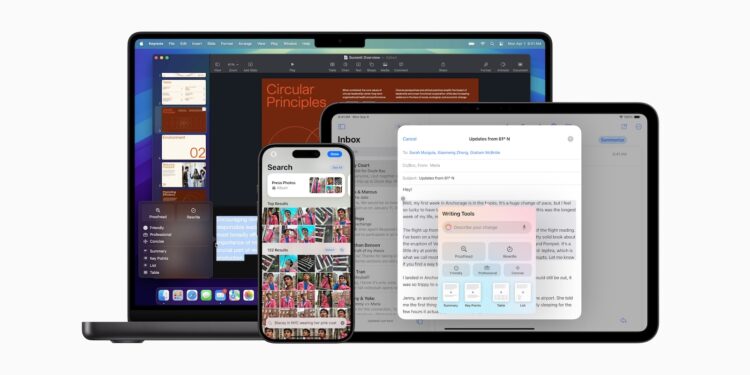Apple plans to introduce its AI features in China in May. A new report from Bloomberg shows how the company is going about it. Since China has strict regulations for artificial intelligence, Apple is relying on local partners: Alibaba and Baidu. While Alibaba is primarily responsible for ensuring that the AI technology meets government requirements, Baidu is providing important features for the iPhone 16. The Chinese version of Apple Intelligence will be significantly different from that in the US or internationally.
Apple is under pressure in China. The market is of enormous importance to the company, but sales figures have recently fallen. Local smartphone manufacturers such as Huawei and Xiaomi have increased their lead, primarily through their own AI features. Apple wants to counter this with an adapted version of its Apple Intelligence, but must abide by the rules of the Chinese government. That is why the company is taking an unusual approach and working with Chinese companies to make its technology possible.
Apple adapts its AI for China
Apple has dedicated teams in the US and China working on adapting Apple Intelligence workIn the US and other markets, the system is based on a combination of on-device processing, private cloud compute and the integration of ChatGPT. In China, this solution cannot be implemented because cloud services from abroad are severely restricted there and Apple is not allowed to use free AI models. Instead, Alibaba is playing a key role. The company is developing an internal device system that adapts Apple's AI models. This adaptation ensures that content meets government requirements. A special function is the integrated censorship and filtering software. It ensures that only permitted content gets through the system. Users should notice as little of this as possible because the software works in the background. Baidu is the second important partner. The company is developing visual intelligence functions for Apple. These are intended for the iPhone 16. This will improve image recognition and processing features.
The Chinese version differs significantly
While the global version of Apple Intelligence relies on a mix of local and server-based AI, the Chinese version works completely differently. Apple is heavily dependent on its partners in China. Without the technology of Alibaba and Baidu, Apple Intelligence would not be feasible there. One important difference is control over content. In the US or Europe, Apple processes data encrypted on its own servers or directly on the device. In China, filtering is done by Alibaba, which gives the government indirect access to the content. This complies with the requirements for foreign technology companies in China. Another difference concerns availability. The new AI functions are only activated on Apple devices sold in China. Users in other countries will continue to receive the international version with more freedom and fewer restrictions and thus significantly more data protection and privacy.
Apple Intelligence: Cupertino between market opportunities and image risks
The decision to change Apple Intelligence in China is a strategic necessity. Apple is losing market share there while Chinese manufacturers are scoring points with their own AI functions. By working with Alibaba and Baidu, Apple can catch up and position itself more strongly again. However, there are risks. Apple emphasizes data protection and user control worldwide - in China, the company cannot fully implement these principles. Adapting to Chinese regulations could affect Apple's image in Western markets. Critics could accuse the company of making too many concessions to the Chinese government. Despite these challenges, Apple remains determined to bring its AI technology to China. Negotiations with the authorities are already underway, but a number of approvals are still needed before Apple Intelligence actually starts in China. (Image: Apple)
- iOS backdoor? USA threatens Britain with consequences
- Apple announces product launch for February 19th





